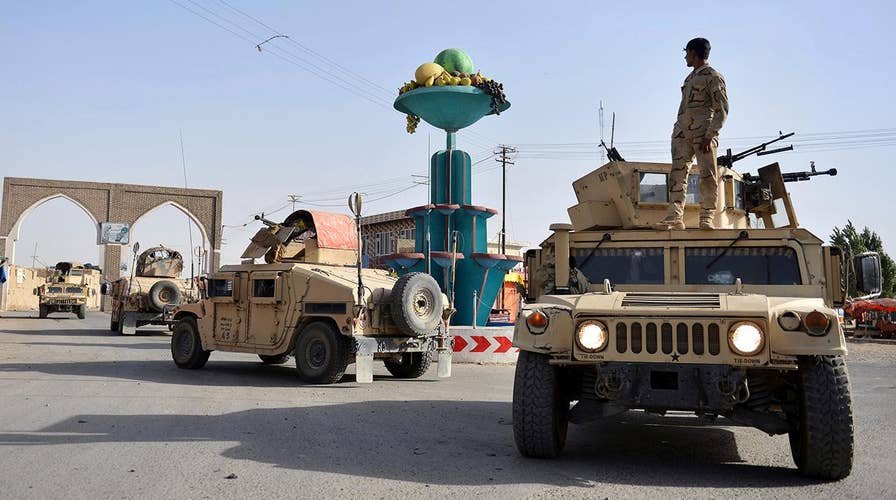Taliban fighters occupy parts of key Afghan city
Massive Taliban assault overwhelms government forces in the provincial capital of Ghazni; Benjamin Hall reports.
KABUL, Afghanistan – Afghan forces battled the Taliban in a key provincial capital for the fourth straight day on Monday, following a massive assault on the eastern city last week that overwhelmed its defensed and allowed insurgents to capture several parts of it, officials said.
The assault on Ghazni, the capital of Ghazni province, was a major show of force by the Taliban, who infiltrated deep into this strategic city barely 120 kilometers (75 miles) from the capital, Kabul.
The United States has sent military advisers to aid Afghan forces.
The multi-pronged attack on Ghazni began on Friday, with insurgents infiltrating people's homes and slipping out into the night to attack Afghan forces. The fighting since has been ferocious and many Afghan troops and insurgents are believed to have died in the battle so far.
Few details have emerged from Ghazni since the Taliban destroyed a telecommunications tower on the city's outskirts, cutting off all landline and cell phone links to the city and making it difficult to confirm details of the fighting.
In Kabul, authorities insisted that the city would not fall to the Taliban and that Afghan forces remained in control of key government positions and other institutions there.
Najib Danish, the Interior Ministry's spokesman, said reinforcements have been sent to Ghazni and were trying to clear it of the Taliban on Monday.
Col. Fared Mashal, the province's police chief, said majority of the insurgents fighting in Ghazni are foreigners, including Pakistanis and Chechens.
Mashal also said that hundreds of Taliban have been killed so far in Ghazni and that 18 security forces are dead.
"The Taliban have failed in reaching their goal," he added.
The fall of Ghazni, a city of 270,000 people, would mark a major victory for the Taliban. It would also cut off a major highway linking Kabul to the southern provinces, the Taliban's traditional heartland.
Over the past months, the insurgents have seized several districts across Afghanistan, staging near-daily attacks on Afghan security forces, but have been unable to capture and hold urban areas.
The United States and NATO formally concluded their combat mission in Afghanistan at the end of 2014, but have since then repeatedly come to the aid of Afghan forces as they struggle to combat the resurgent Taliban.
The United Nations has expressed its concerns for the civilians caught up in the fighting in Ghazni.
Ghazni's residents "have seen their city turn into a battlefield since Friday morning, with fighting and clashes reportedly still ongoing. We have received initial reports of a number of civilian casualties and of people trying to reach safe areas outside of the city," said Rik Peeperkorn, acting U.N. humanitarian coordinator for Afghanistan.
Ghazni's hospitals are running out of medicines and people are unable to safely bring casualties, Peeperkorn's statement added. Electricity, water supply and food are also running low, the statement said.
"Parties to the conflict need to ensure that access to medical services is not denied and respect for medical facilities and staff is upheld," Peeperkom said.
Meanwhile, the International Federation of Journalists and the Afghan Independent Journalists Association jointly put out a statement condemning the violence in Ghazni and attacks on journalists there.
Media technician Mohammad Dawood was among those killed in Ghazni, the statement said, and also condemned the torching of Ghazni's radio and television station.
___
Associated Press reporter Mohammad Anwar Danishyar in Kabul, Afghanistan, contributed to this report.

